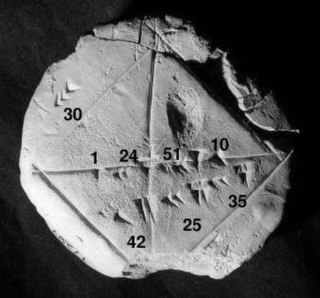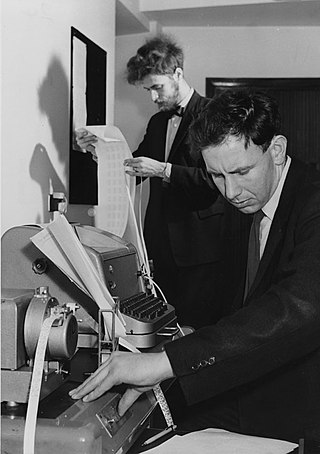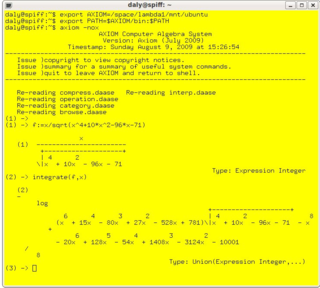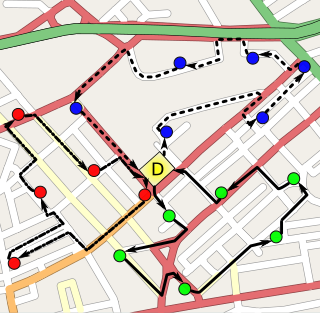Related Research Articles

Computer science is the study of computation, information, and automation. Computer science spans theoretical disciplines to applied disciplines. Though more often considered an academic discipline, computer science is closely related to computer programming.
Mathematics is an area of knowledge that includes the topics of numbers, formulas and related structures, shapes and the spaces in which they are contained, and quantities and their changes. These topics are represented in modern mathematics with the major subdisciplines of number theory, algebra, geometry, and analysis, respectively. There is no general consensus among mathematicians about a common definition for their academic discipline.

Numerical analysis is the study of algorithms that use numerical approximation for the problems of mathematical analysis. It is the study of numerical methods that attempt to find approximate solutions of problems rather than the exact ones. Numerical analysis finds application in all fields of engineering and the physical sciences, and in the 21st century also the life and social sciences, medicine, business and even the arts. Current growth in computing power has enabled the use of more complex numerical analysis, providing detailed and realistic mathematical models in science and engineering. Examples of numerical analysis include: ordinary differential equations as found in celestial mechanics, numerical linear algebra in data analysis, and stochastic differential equations and Markov chains for simulating living cells in medicine and biology.
A computer algebra system (CAS) or symbolic algebra system (SAS) is any mathematical software with the ability to manipulate mathematical expressions in a way similar to the traditional manual computations of mathematicians and scientists. The development of the computer algebra systems in the second half of the 20th century is part of the discipline of "computer algebra" or "symbolic computation", which has spurred work in algorithms over mathematical objects such as polynomials.

Theoretical computer science (TCS) is a subset of general computer science and mathematics that focuses on mathematical aspects of computer science such as the theory of computation, formal language theory, the lambda calculus and type theory.
Axiom is a free, general-purpose computer algebra system. It consists of an interpreter environment, a compiler and a library, which defines a strongly typed hierarchy.
In mathematics and computer science, computational number theory, also known as algorithmic number theory, is the study of computational methods for investigating and solving problems in number theory and arithmetic geometry, including algorithms for primality testing and integer factorization, finding solutions to diophantine equations, and explicit methods in arithmetic geometry. Computational number theory has applications to cryptography, including RSA, elliptic curve cryptography and post-quantum cryptography, and is used to investigate conjectures and open problems in number theory, including the Riemann hypothesis, the Birch and Swinnerton-Dyer conjecture, the ABC conjecture, the modularity conjecture, the Sato-Tate conjecture, and explicit aspects of the Langlands program.
Computational science, also known as scientific computing, technical computing or scientific computation (SC), is a division of science that uses advanced computing capabilities to understand and solve complex physical problems. This includes
In mathematics, a differential-algebraic system of equations (DAE) is a system of equations that either contains differential equations and algebraic equations, or is equivalent to such a system.

Joseph Amadee Goguen was an American computer scientist. He was professor of Computer Science at the University of California and University of Oxford, and held research positions at IBM and SRI International.

Computational mathematics is an area of mathematics devoted to the interaction between mathematics and computer computation.
The Library of Efficient Data types and Algorithms (LEDA) is a proprietarily-licensed software library providing C++ implementations of a broad variety of algorithms for graph theory and computational geometry. It was originally developed by the Max Planck Institute for Informatics Saarbrücken. Since 2001, LEDA is further developed and distributed by the Algorithmic Solutions Software GmbH.

Computational statistics, or statistical computing, is the bond between statistics and computer science, and refers to the statistical methods that are enabled by using computational methods. It is the area of computational science specific to the mathematical science of statistics. This area is also developing rapidly, leading to calls that a broader concept of computing should be taught as part of general statistical education.

In mathematics and computer science, computer algebra, also called symbolic computation or algebraic computation, is a scientific area that refers to the study and development of algorithms and software for manipulating mathematical expressions and other mathematical objects. Although computer algebra could be considered a subfield of scientific computing, they are generally considered as distinct fields because scientific computing is usually based on numerical computation with approximate floating point numbers, while symbolic computation emphasizes exact computation with expressions containing variables that have no given value and are manipulated as symbols.

Applied mathematics is the application of mathematical methods by different fields such as physics, engineering, medicine, biology, finance, business, computer science, and industry. Thus, applied mathematics is a combination of mathematical science and specialized knowledge. The term "applied mathematics" also describes the professional specialty in which mathematicians work on practical problems by formulating and studying mathematical models.
Gunther Schmidt is a German mathematician who works also in informatics.
Vladimir P. Gerdt was a Russian mathematician and a full professor at the Joint Institute for Nuclear Research (JINR) where he was the head of the Group of Algebraic and Quantum Computations. His research interests were concentrated in computer algebra, symbolic and algebraic computations, algebraic and numerical analysis of nonlinear differential equations, polynomial equations, applications to mathematics and physics, and quantum computation with over 210 published articles.
Numerical algebraic geometry is a field of computational mathematics, particularly computational algebraic geometry, which uses methods from numerical analysis to study and manipulate the solutions of systems of polynomial equations.
Validated numerics, or rigorous computation, verified computation, reliable computation, numerical verification is numerics including mathematically strict error evaluation, and it is one field of numerical analysis. For computation, interval arithmetic is used, and all results are represented by intervals. Validated numerics were used by Warwick Tucker in order to solve the 14th of Smale's problems, and today it is recognized as a powerful tool for the study of dynamical systems.
Deepak Kapur is a Distinguished Professor in the Department of Computer Science at the University of New Mexico.
References
- Wang, Dongming; Zhi, Lihong (2007). Symbolic-numeric Computation. Springer. ISBN 978-3-7643-7983-4.
- Mourrain, Bernard; Pavone, Jean-Pascal; Trebuchet, Philippe; Tsigaridas, Elias P.; Wintz, Julien (2008). "SYNAPS: A Library for Dedicated Applications in Symbolic Numeric Computing". Software for Algebraic Geometry. The IMA Volumes in Mathematics and its Applications. Vol. 148. pp. 81–109. CiteSeerX 10.1.1.135.1680 . doi:10.1007/978-0-387-78133-4_6. ISBN 978-0-387-78132-7.
- Grabmeier, Johannes; Kaltofen, Erich; Weispfenning, Volker, eds. (2003). "Hybrid methods" (PDF). Computer algebra handbook: foundations, applications, systems, Volume 1. Springer. ISBN 978-3-540-65466-7.
- Robbiano, Lorenzo; Abbott, John (2009). Approximate Commutative Algebra. Springer. ISBN 978-3-211-99313-2.
- Langer, Ulrich; Paule, Peter, eds. (2011). Numerical and Symbolic Scientific Computing. Springer. ISBN 978-3-7091-0793-5.